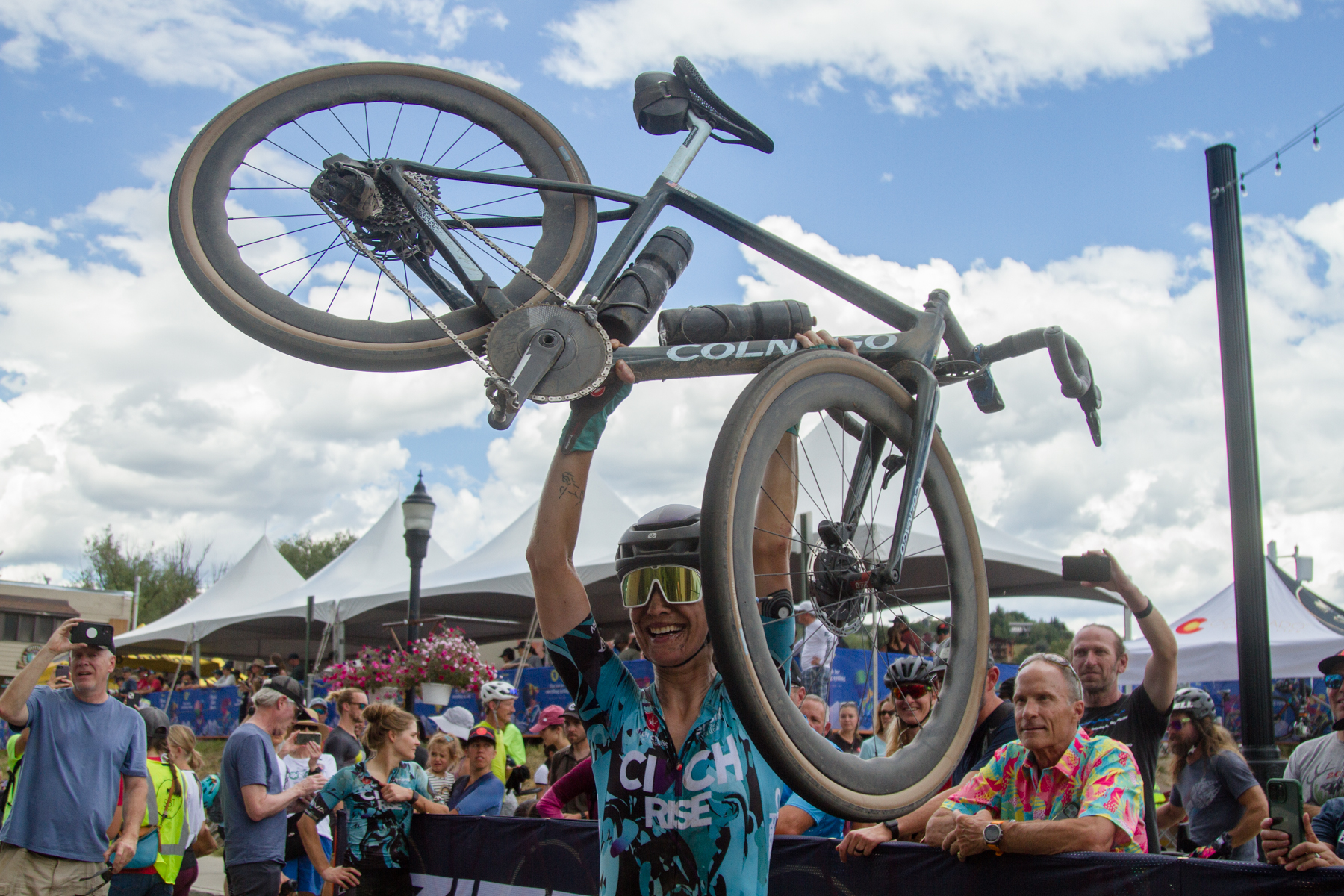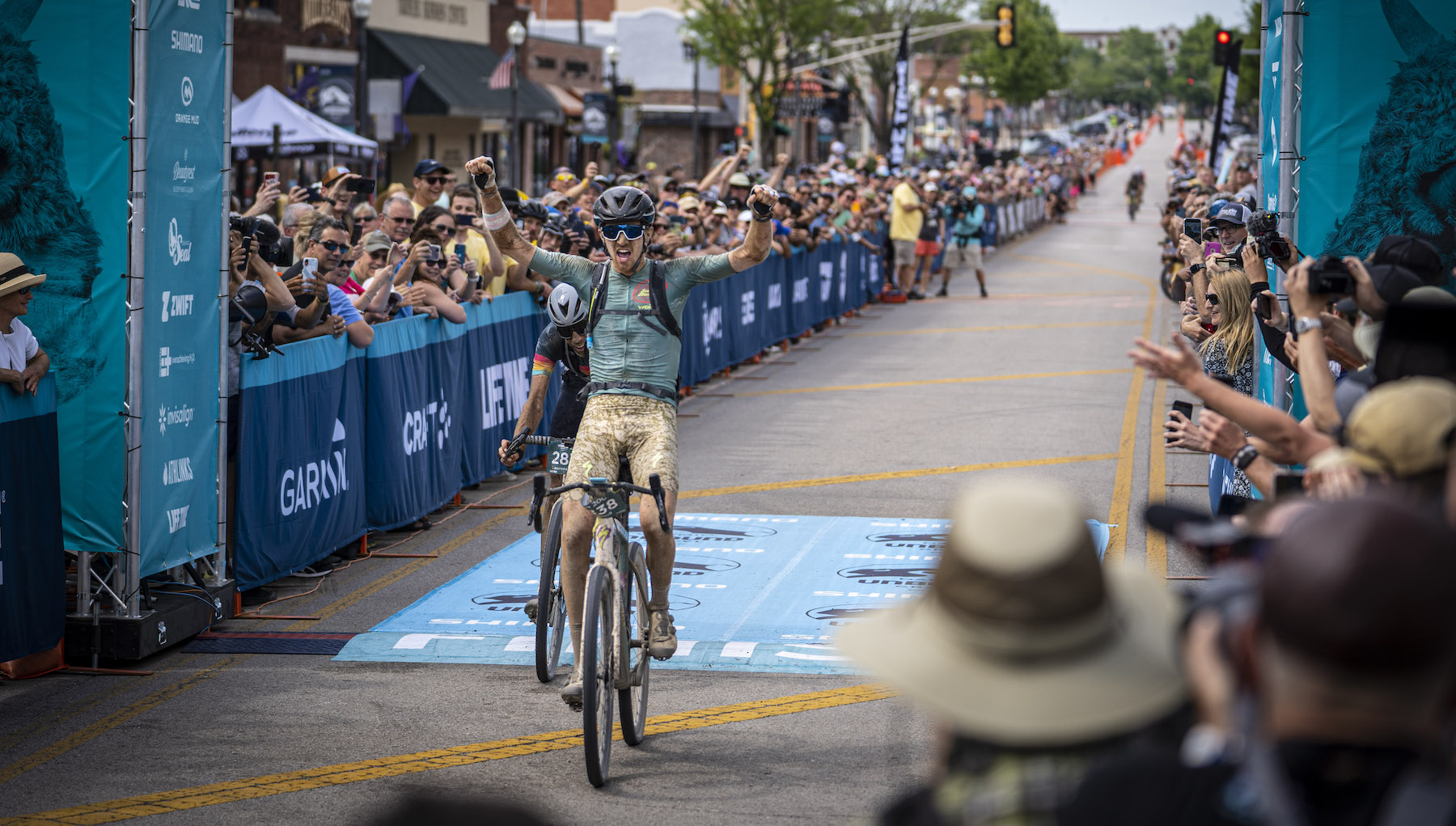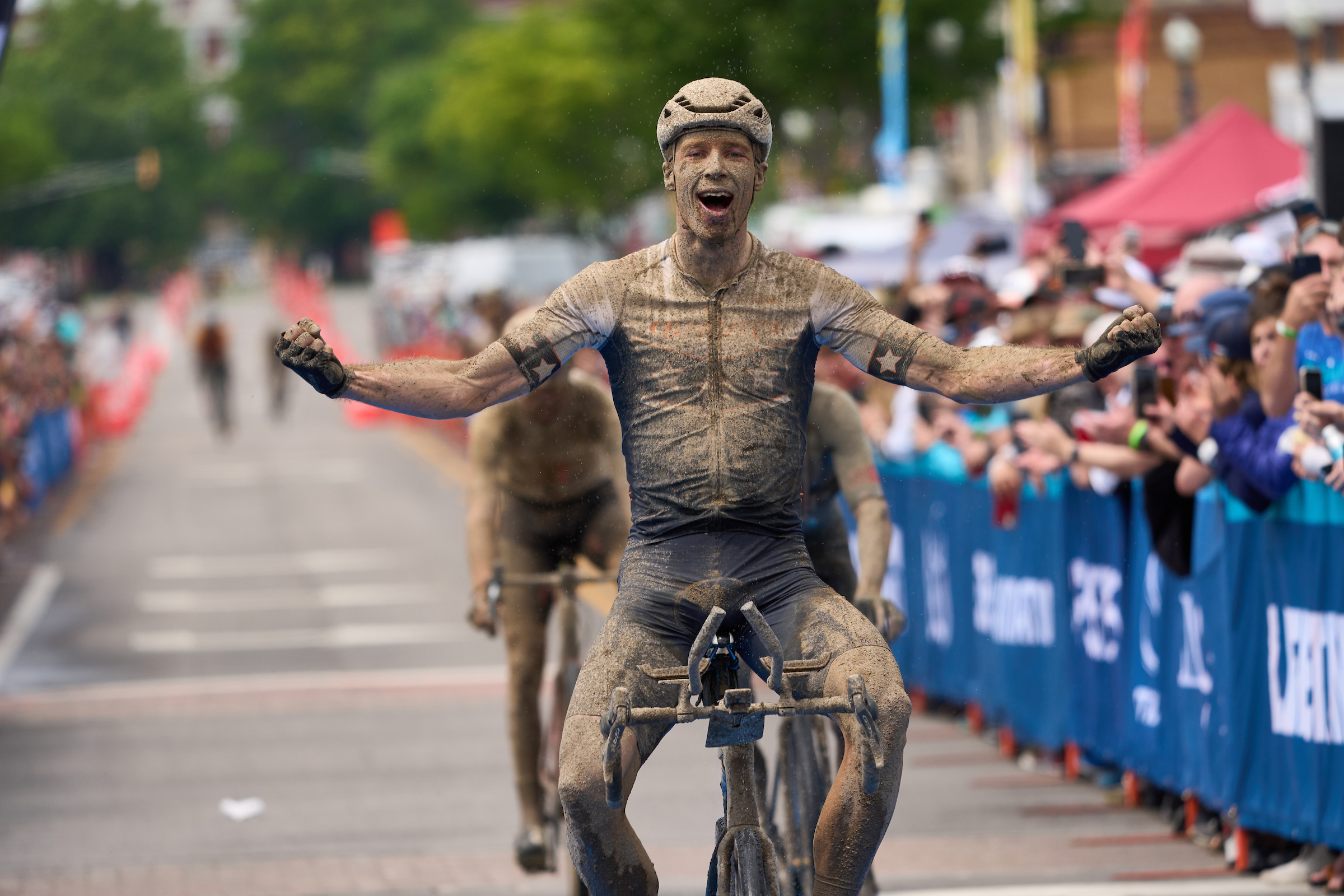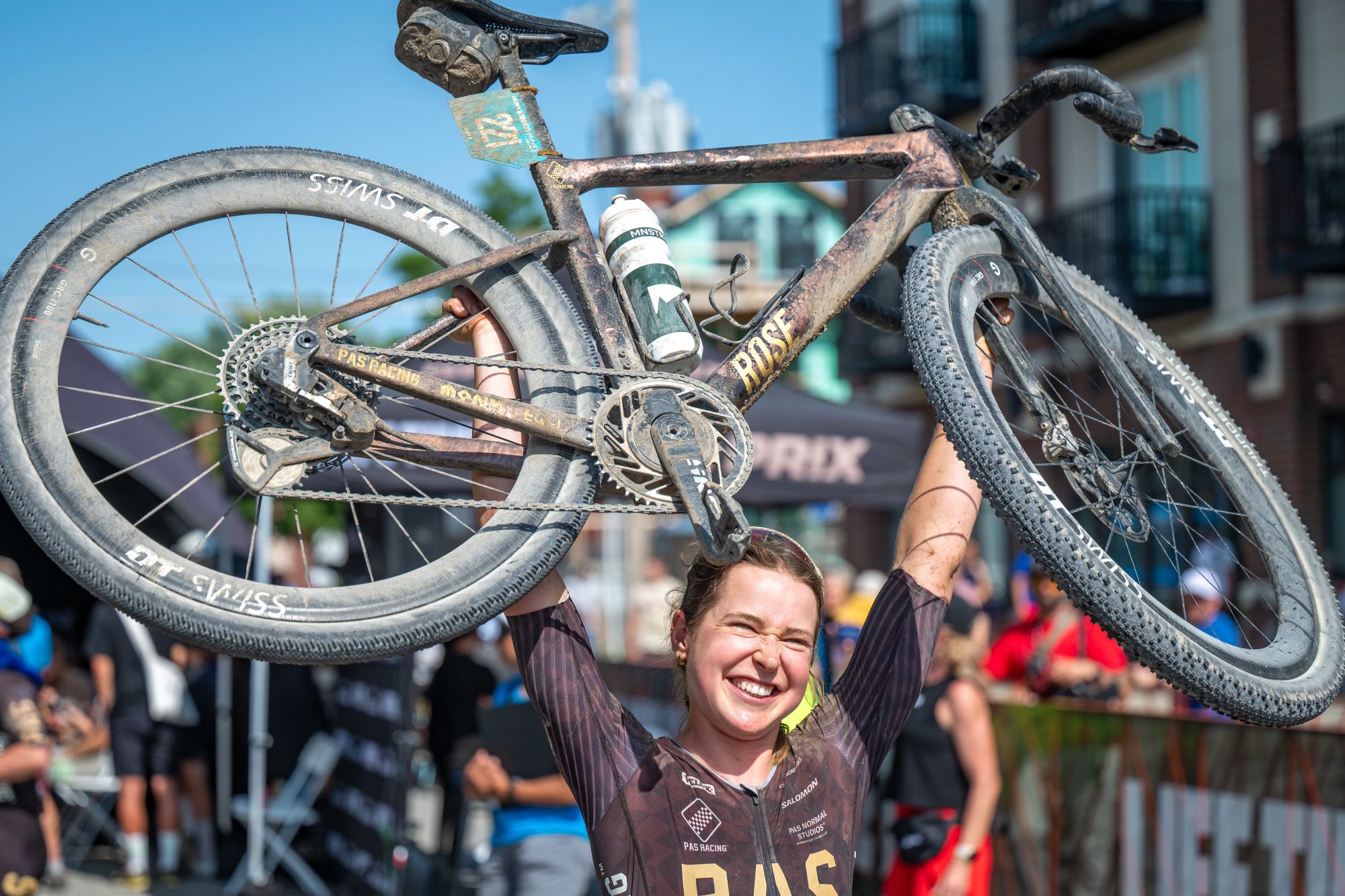Unbound Gravel. In the words of co-director Kristi Mohn, it is ‘the race that everyone loves to hate.” And she’s not wrong. Every year, without fail, the moment the first tyres cross the finish line in Emporia, Kansas, the critiques start rolling in. Too muddy. Too dangerous. Too big. Too corporate. Too… something. And yet, despite the noise, or maybe partly because of it, Unbound remains the gravel race. The one that changed everything. The one that helped turn gravel from a ragtag subculture into an international phenomenon with its own pros, its own economy, and its own set of controversies.
It’s no hyperbole to say that Unbound shaped what professional gravel cycling looks like today. And for some riders, it’s done something even bigger: it’s changed their lives.
Every year, 5,000 riders make the trek to middle-of-nowhere Kansas, while thousands more follow from home, hoping to win a spot in next year’s entry lottery. For most, simply finishing Unbound is a personal journey. But for the select few chasing victory in the 200-mile flagship event, the reward goes far beyond a proverbial crown and seeing your face on a flag in downtown Emporia. Winning Unbound is a springboard to a career you didn’t even know was possible.
‘Unbound is the first true monument of its genre’ – Keegan Swenson
(Image credit: Life Time)
Keegan Swenson has established himself as the rider everyone measures against in American off-road racing. In the past few years, the 31-year-old has seemed nearly untouchable in the gravel and marathon mountain bike racing scene. He’s won the biggest and toughest races, including Unbound Gravel, SBT GRVL, Big Sugar Gravel, the Sea Otter Classic, Leadville 100, Crusher in the Tushar, as well as the USA gravel and XC mountain bike national championships. And he’s won many of them multiple times. He has dominated the Life Time Grand Prix, winning the overall series three years in a row. And as of last weekend, he added a world title to his palmares by winning the brutal UCI cross-country marathon world championship race.
And yet, among all the titles and race wins, Unbound still holds a special place.
“For me personally, it’s one of the races I am most proud to have won. I think it played a key role in shifting the narrative of me being ‘just a mountain biker’ to being a legitimate threat at any bike race,” he said.
“Unbound is totally unique. The length of the day, weather, and a course that doesn’t have key defining characteristics that allow bike skill or power-to-weight to really separate the field all work together to make it one of the hardest races to win.
“In terms of gravel, I think it’s the first true monument of this genre. And I think it legitimises any rider who wins it in a way that is similar to the legitimising effect of winning a monument for a road racer.”
For all he’s already achieved, Swenson’s ambitions at Unbound aren’t behind him.
“It’s one of the races I look forward to most every year, and I look forward to grabbing another Unbound win,” he said.
‘I never thought I’d come back to pro cycling’ – Lauren De Crescenzo

(Image credit: Linda Guerrette)
Lauren De Crescenzo’s cycling career has been one of promise, dramatic setback and reinvention.
In April 2016, she was just 25, a neo-pro with the Visit Dallas DNA Pro Cycling team, when a freak crash in the San Dimas Stage Race nearly ended her life. Leading out a teammate, her handlebars caught a fence, sending her over the bars. Her next memory came three weeks later in a hospital bed.
In that blackout stretch, De Crescenzo had been airlifted, placed in a medically induced coma to stem brain bleeding, and treated for a fractured skull, broken vertebrae, hand fractures and severe facial injuries. She had to relearn how to walk, balance and even talk. For most riders, that would have been the end.
Instead, she clawed her way back, returning to bike racing and the podium’s top step. Five years after her horror crash, she took a dominant victory at Unbound Gravel, kicking off a multi-discipline career that has seen her win, among others, the Tour of the Gila stage race, The MidSouth (three times) and The Rad Dirt Fest, along with podiums at Crusher in the Tushar and Big Sugar Gravel.
“I never thought I’d come back to pro cycling,” De Crescenzo reflected.
When she lined up at Unbound in 2021, she simply set out to survive the 200 miles. At the time, she was working full-time as an epidemiologist at the Centers for Disease Control in Atlanta, serving on the COVID task force. The pandemic, however, unexpectedly opened the door back to competitive fitness. With offices closed, she no longer spent hours commuting and instead poured that time into training. In those months of isolation, riding long and often became both a habit and an outlet; the kind of preparation that quietly set the stage for her biggest win.
“After I won, I remember one of my friends telling me, ‘Lauren, your life’s about to change. You’ll be quitting your job soon’. And I was like, ‘no way. I’m going back to the office on Monday’,” De Crescenzo recalled.
And she did. She worked for two more months before the sponsorship deals that came out of the Unbound win were enough to match the salary she was making at the CDC.
“My legs will only be able to do this for so long, and the cubicle will always be there waiting for me,” the 35-year-old said about how she justified leaving the CDC to herself.
“It was a really hard decision for me to make because I thought that I had my whole life figured out. Bike racing was behind me and I had my dream office job as an epidemiologist, saving the world,” she said.
As a young road racer, she had always held three odd jobs just ‘trying to make the dream’. She’d never actually made a livable wage from bike racing before.
“When I finally had the opportunity to [race bikes] full time. I just jumped on it immediately.
“Winning Unbound gave me the career and it gave me the opportunity that I always wanted. I’ve won a lot of races but that was the biggest one. That was the ultimate palmarès.”
Unbound remains a central focus for De Crescenzo, even with her face already immortalized on a flag in downtown Emporia. Finishing sixth this year left her wanting more, especially as the race grows tougher each season, with deeper, more international fields and ever-evolving tactics.
While her sponsors don’t demand specific results, Unbound still carries weight, both personally and professionally. Performing well here is about chasing excellence in the event and discipline that continues to shape her career.
‘When I won, I was facing this realisation of like, oh sh*t, I could quit my job’ – Ian Boswell

(Image credit: Wahoo/Andy Chastain)
Before gravel, Ian Boswell spent nearly a decade covering some of the hardest miles the road has to offer. On the WorldTour, he rode five seasons with Team Sky (2013–2017) and two with Katusha–Alpecin (2018–2019), starting all three Grand Tours along the way. But it wasn’t until 2021, after stepping away from the WorldTour, that he netted his defining win: outsprinting Dutchmen Laurens ten Dam to take victory at Unbound 200
“Oddly, it’s probably the biggest result I’ve had in my career,” Boswell reflected.
While the gravel peloton is now filled with ex-pro roadies enjoying an extended off-ramp to retirement, for Boswell it was never meant to be a career pivot. But it became one anyway.
“When I started doing gravel it wasn’t really a career for me. It was just something I was doing adjacent to my role at Wahoo,” he explained.
“Unbound was my second-ever gravel race. I obviously knew what it was. I knew how big it was, but I didn’t really anticipate winning the thing. By no means was I looking at it like, ‘Cool, if I win I can leave my job and go back to pro racing’.”
But then he won, and the offers started pouring in.
“I didn’t realize the importance of the event in the industry. That [winning Unbound] can changed the course of your career. I think that really caught me by surprise. I had brands reaching out to me that I had no affiliation with.”
It made him confront a question he never thought he’d face.
“When I won, I was facing this realisation of like, oh sh*t, I could quit my job at Wahoo and go back to full-time racing.”
In the end, he opted for balance, prioritising his family and his job, and racing semi-seriously as long as it remained fun.
“Still, it caught me off-guard. If I had wanted to quit and go back to racing, I could have.”
What surprised him even more was the reach of that victory. He recalls how Richie Porte had just won the Critérium du Dauphiné, a marquee WorldTour race, yet still messaged him to congratulate him on Unbound.
“The fact that you can have the Dauphiné or the Giro and Unbound all in the same newsfeed still kind of blows my mind.”
From his vantage point, Unbound’s stature has only grown yet it’s no longer the singular career-defining race it was just a few years ago.
“While other events like The Traka have grown in notoriety, there’s still this notion that winning Unbound can change the course of your career. And I do think that it definitely puts athletes on the map. But it’s getting harder,” the 34-year-old reflected.
“There are a lot of good gravel and privateer athletes now. And the money isn’t dried up per se, but it’s accounted for.”
Still, when it comes to anyone with gravel ambitions, it’s the pinnacle event on the calendar.
“It just has that legacy and kind of mystique of it still being the biggest event. The distance, the course, the history — it’s legacy that bolsters the popularity.”
Boswell has seen the event evolve from a personal odyssey to something with live streaming, helicopters and motos, and he has mixed feelings about that shift.
“It has dramatically changed the feeling of the event, especially for the elite riders. The first year I did it, we stopped at the aid stations. Not long, but just enough time to grab everything you needed. This year, I didn’t unclip the entire 200 miles. I grabbed a feed bag, I peed off the bike. There was no stopping,” he said.
These days, Boswell is more known for his gravel career than the decade he spent at road cycling’s top tier. In addition to standing on the podium at Unbound twice (1st in 2021, 3rd in 2022), he has also won Belgian Waffle Ride (BWR) Asheville and the Barry-Roubaix race.
He finished eighth at the record-paced 2025 edition, which Boswell says may have been his last.
“I’ve had five clean runs at the event, which is pretty unprecedented,” he said. “It’s a really nice way to call it quits.” But only on the 200-mile elite race.
“I’m sure I’ll go back in some capacity, whether it’s to lead a group ride, do the 100 or do commentary,” he said.
“In a way, {Unbound] has single-handedly prolonged my career into something far bigger and more rewarding than I could have thought. And I think that’s kind of why I’ve continued to go back.”
‘Unbound changed my career’ – Ivar Slik

(Image credit: Life Time)
In 2022, Ivar Slik outsprinted his breakaway companions, including Keegan Swenson and Ian Boswell, to become the first non-American winner of the men’s elite race at Unbound. The Dutchman was part of the so-called “Dutch Mafia,” a group of ex-pro road racers led by Laurens ten Dam that have steadily infiltrated the American gravel scene. As Unbound’s prestige has grown, so too has its international presence: in the three years since Slik’s breakthrough, two more non-Americans have claimed the men’s title. His victory was perhaps the first clear sign of this global takeover of the Kansas classic.
The 32-year-old came up through the European road system part of Rabobank’s famed development program, before turning pro with Roompot for two seasons. When that contract wasn’t renewed, he stepped back to semi-professional road racing and also became a heavy hitter in the Dutch beach-racing scene.
By 2021 he made the switch fully to gravel. A year later, everything changed. In the spring of 2022, he won the Traka-Unbound double, transforming his career.
He knew he’d been in form. After the Traka, he kicked off his U.S. campaign with a second-place result at Gravel Locos in the run-up to Unbound. He felt that without any bad luck or mechanicals, he had it in him to do well. But the win? “I really hadn’t counted on that.”
Everything changed in an instant.
“The attention that came at me after the finish, as the first non-American winner, it was overwhelming,” he said.
Dutch talk shows asked for him, multiple bike brands offered him contracts, and for the first time, he could live as a true professional athlete.
“Yes, [winning Unbound] has certainly changed my career,” he stated.
Ten Dam’s early adoption of the discipline paired with Slik’s win has also had a ripple effect back home.
“Gravel has become much more popular in the Netherlands. More road racers are making the switch. It’s more adventurous, safer, and you ride places you’d never normally go. A gravel bike is also more versatile; on the road it’s almost as fast as a road bike, but you can also ride singletrack and gravel paths,” Slik said.
Unbound remains his career highlight as well as his goal.
“I dream of more: winning Unbound again, the European Championships…they’re ambitious goals, but at 32, I’m in my strongest years.”
His path post-Unbound victory hasn’t been without setbacks. In 2024, just a week and a half before Unbound, he collided with a car head-on while training. His injuries were significant and derailed his season. Even a year later he says he’s not 100 percent recovered “but I feel I’m getting closer step by step.”
Even so, his 2022 triumph still defines how he is seen, both in the U.S. and Europe. “Even if the results haven’t been there this year, I’m still treated as the first non-American Unbound winner at every race. Organisers want me at the start, I get free race entries, discounts on lodging… the impact of that win is still there.”
For Slik, Unbound remains unrivaled.
“It’s the biggest gravel event in the world, a unique experience every gravel rider should have once. And if you win? Definitely career-changing. Even a top 10 can have an impact.”
‘Being on sabbatical is the reason I could win Unbound’ – Karolin Karolina Migoń

(Image credit: Life Times)
If you’re not yet familiar with Karolina Migoń, now is the time to remember her name. A back-to-back winner of the Traka 360, the 29-year-old Polish rider has already proven herself a dominant force on Europe’s gravel scene. But in her Unbound debut last year, mechanicals kept her from the front. This year, she rode strategically and defensively, ultimately storming to victory in Emporia after 130 miles in a breakaway.
A software engineer by trade, Migoń entered Unbound while on sabbatical, using the rare luxury of extra time to train without distraction. The payoff was immediate.
“I’ve got a lot of messages [since my Unbound win]. Some doors have already opened that I could only dream about when it comes to the sponsors and opportunities,” she said. “It’s pretty funny because it’s just one race. I believe that I already had some good results, but winning [Unbound] changes a lot.”
The scale of her win was magnified by this year’s live broadcast. “When it comes to the visibility, [Unbound is] a different level. Everyone could watch it. You could already see from previous winners that they kind of became like public figures after winning Unbound. I think that that’s why the race is so special.”
Though she already had podiums and major victories in Europe, Unbound gave Migoń a new level of confidence. “I think right now, it adds a bit of belief in myself, after winning such a big race. The belief that I’m a top-level athlete… at some point you’re like, okay, I’m probably one of them. That feels crazy.”
For now, she still balances the dual life of cyclist and tech professional but that could soon change.
“I still have a normal job contract and I go back to work in October,” she explained. “After trying [full-time racing while on sabbatical], it would be nice to not have these two parallel lives, and just being 100% in the sport. It makes it much easier. Being on sabbatical is the reason I could win Unbound, because I didn’t have all the other stuff around me, and I could just focus on training in the month before it.”
The glimpse of possibility has only fueled her ambitions.
“I love cycling and meeting all the people and the lifestyle of travel. Sometimes it’s hard and you can be homesick a bit, but it’s something incredible. That’s my plan for the next year: to be 100% athlete.”
Looking ahead to 2026, Migoń has her eyes on a variety of targets — including a potential campaign in the Life Time Grand Prix — but a return to Emporia tops the list.
“It’s just a special race with such a big and strong field. It’s a one-day race, so everything can happen, but I think it’s worth going even for just the experience.”
Explore More
